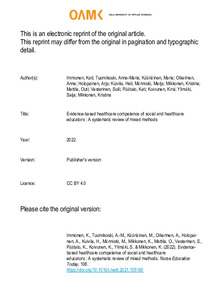Evidence-based healthcare competence of social and healthcare educators: A systematic review of mixed methods
Immonen, Kati; Tuomikoski, Anna-Maria; Kääriäinen, Maria; Oikarinen, Anne; Holopainen, Arja; Kuivila, Heli; Männistö, Merja; Mikkonen, Kristina; Mattila, Outi; Vesterinen, Soili; Päätalo, Kati; Koivunen, Kirsi; Ylimäki, Saija; Mikkonen, Kristina (2022)
Lataukset:
Immonen, Kati
Tuomikoski, Anna-Maria
Kääriäinen, Maria
Oikarinen, Anne
Holopainen, Arja
Kuivila, Heli
Männistö, Merja
Mikkonen, Kristina
Mattila, Outi
Vesterinen, Soili
Päätalo, Kati
Koivunen, Kirsi
Ylimäki, Saija
Mikkonen, Kristina
Elsevier
2022
Julkaisun pysyvä osoite on
https://urn.fi/URN:NBN:fi-fe2022020115045
https://urn.fi/URN:NBN:fi-fe2022020115045
Tiivistelmä
Background
Social and healthcare operating environments are constantly evolving, so educators have major responsibility for ensuring that Evidence-Based Healthcare is included in the education of future healthcare professionals and applied in their practice. A holistic understanding and implementation of evidence-based healthcare competence is critical to the delivery of appropriate, relevant, and effective healthcare.
Aim
To identify and describe social and healthcare educators' EBHC competence according to the five main components of the JBI model and associated factors to it.
Methods
A mixed-methods systematic review was conducted, with inclusion and exclusion criteria identified according to PICo and PEO inclusion criteria for qualitative and quantitative studies, respectively. Five databases—the CINAHL (EBSCO), PubMed, Scopus, Medic and ProQuest databases— were searched in June 2020. In total, 12 original studies (qualitative and quantitative) were included for quality appraisal, data extraction and narrative synthesis.
Results
Key competence areas addressed in the selected studies were integrated into the four components of the JBI model of EBHC (evidence generation, synthesis, transfer, and implementation, and focus on its ultimate goal: global health). In the majority of chosen studies', it was found that educators had a positive attitude towards EBHC and wanted to stay up-to-date in the areas of global health and collaboration. Educators demonstrated their abilities to locate, appraise, and interpret the best current relevant evidence. They knew how to integrate EBHC into their teaching and had strong communication skills in evidence transfer. Their EBHC competence was strongest in the educational context and educators could transfer evidence when teaching but were not able to translate it into how to implement EBHC in clinical care. In addition to higher academic education and work experience, organizational support and continuous education reportedly play essential roles in development of educators' EBHC competence.
Conclusion
Measures are needed to maintain and improve social and health educators' EBHC competence and develop robust methods to reliably assess it.
Social and healthcare operating environments are constantly evolving, so educators have major responsibility for ensuring that Evidence-Based Healthcare is included in the education of future healthcare professionals and applied in their practice. A holistic understanding and implementation of evidence-based healthcare competence is critical to the delivery of appropriate, relevant, and effective healthcare.
Aim
To identify and describe social and healthcare educators' EBHC competence according to the five main components of the JBI model and associated factors to it.
Methods
A mixed-methods systematic review was conducted, with inclusion and exclusion criteria identified according to PICo and PEO inclusion criteria for qualitative and quantitative studies, respectively. Five databases—the CINAHL (EBSCO), PubMed, Scopus, Medic and ProQuest databases— were searched in June 2020. In total, 12 original studies (qualitative and quantitative) were included for quality appraisal, data extraction and narrative synthesis.
Results
Key competence areas addressed in the selected studies were integrated into the four components of the JBI model of EBHC (evidence generation, synthesis, transfer, and implementation, and focus on its ultimate goal: global health). In the majority of chosen studies', it was found that educators had a positive attitude towards EBHC and wanted to stay up-to-date in the areas of global health and collaboration. Educators demonstrated their abilities to locate, appraise, and interpret the best current relevant evidence. They knew how to integrate EBHC into their teaching and had strong communication skills in evidence transfer. Their EBHC competence was strongest in the educational context and educators could transfer evidence when teaching but were not able to translate it into how to implement EBHC in clinical care. In addition to higher academic education and work experience, organizational support and continuous education reportedly play essential roles in development of educators' EBHC competence.
Conclusion
Measures are needed to maintain and improve social and health educators' EBHC competence and develop robust methods to reliably assess it.
